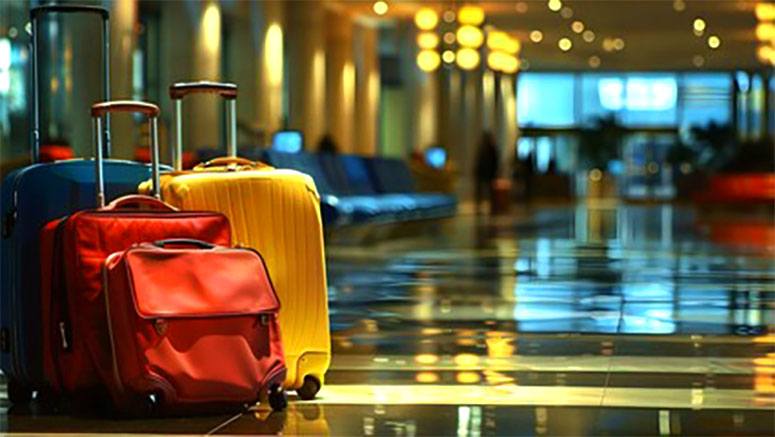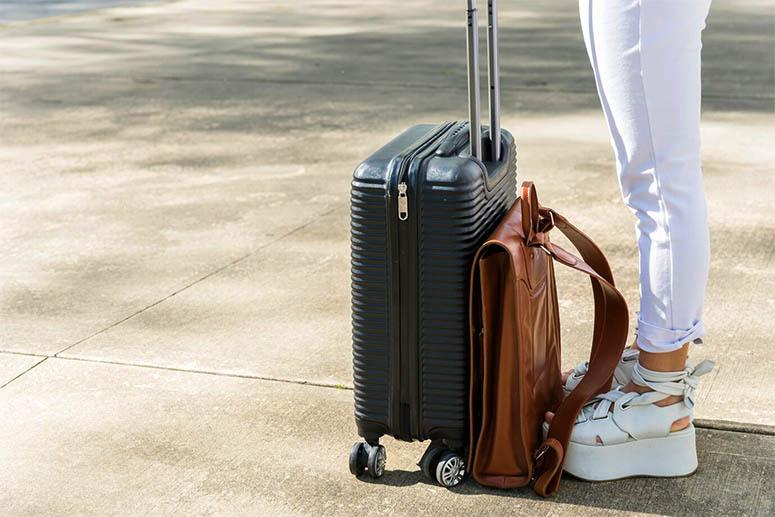Contents
What are the odds of getting lost luggage? Lost luggage can be a traveler’s worst nightmare, leaving you anxious and disorganized even before your trip begins. But just how common is it for bags to go missing?
This article explores the likelihood of lost luggage, revealing statistics that highlight the issue and the primary reasons behind it.
It also provides practical tips on how to prevent your bags from getting lost and outlines the steps to take if you find yourself in this unfortunate situation. Prepare to travel with confidence!
What is lost luggage?
Lost luggage refers to checked baggage that has either been misplaced or mishandled by airlines during travel.
This issue is a significant concern for travelers, as it can lead to delays, travel anxiety, and additional stress, especially when it involves international travel or connecting flights.
According to travel statistics, lost luggage incidents can occur due to various reasons, including airline mishandling, baggage handling errors, and improper airport procedures.
Proper documentation and following airline policies are essential for luggage retrieval and compensation claims when baggage is lost.
What are the odds of getting lost luggage?
The odds of experiencing lost luggage have become a topic of interest as travel statistics reveal trends in baggage mishandling rates across the airline industry.
While some airlines demonstrate high reliability and lower luggage mishandling rates, others may face challenges due to frequent travel disruptions and inadequate baggage handling processes, leading to increased chances of luggage loss.
Understanding these odds can help travelers make informed decisions when selecting airlines and planning their trips, particularly for domestic flights or international travel.
1. How many bags are lost each year?
Each year, millions of bags are reported lost, highlighting a persistent issue in the airline industry related to baggage mishandling.
Recent travel statistics indicate that while some airlines have made significant improvements in their baggage handling processes, the overall number of lost bags remains alarmingly high, suggesting that proper luggage management is still a challenge for many carriers.
This necessitates enhanced airport operations and streamlined baggage systems to better track and manage checked baggage throughout the travel journey.
In fact, according to industry reports, approximately 25 million bags were delayed or lost globally in recent years, with the numbers indicating a slight decrease in mishandled baggage, thanks in part to advancements in technology and better staff training.
Some regions are experiencing more success than others – for instance, airlines in Europe have seen a notable decline in lost baggage incidents, while other regions still struggle with inefficiencies.
The implications of lost baggage extend beyond mere inconvenience for travelers – it can lead to stress and frustration, impacting their overall satisfaction with the airline.
This situation underscores the importance of efficient baggage inspection systems, timely lost baggage reports, and proactive airline strategies to further reduce mishandling and optimize passenger experience.
2. What percentage of bags are lost?

While the exact percentage of bags lost varies annually, recent statistics reveal that approximately 1% of checked luggage is mishandled or lost, which translates to millions of bags each year according to travel statistics reports.
What are the odds of getting lost luggage? Factors contributing to this rate include delays in baggage claims, insufficient baggage handling protocols, and discrepancies in airline policies, which can lead to confusion during luggage retrieval.
Understanding these percentages can provide travelers with insights into the reliability of various airlines and their baggage handling processes.
This figure is not just a number – it has a profound impact on how consumers plan their travels and choose their preferred airlines.
For many travelers, the assurance of reliable passenger services is a critical factor influencing their choice, as frequent fliers may place higher trust in airlines that boast lower rates of lost luggage.
This statistic urges airlines to enhance their customer service strategies, developing quicker and more effective responses to baggage issues, thus boosting overall airline reliability and further instilling confidence in their passengers.
Ultimately, being mindful of these loss percentages can help travelers make informed decisions and mitigate stress related to luggage management during travel planning.
3. What are the top reasons for lost luggage?
The top reasons for lost luggage often stem from a combination of airline policies, travel disruptions, and inadequate luggage management systems.
Common causes include flight delays leading to misrouted luggage, improper baggage handling during transfers, and insufficient passenger documentation at check-in.
Such factors contribute to the challenges of luggage loss prevention, making it essential for airlines to adopt more efficient baggage handling processes and for travelers to be aware of the risks involved in their journey.
To effectively reduce the likelihood of losing personal belongings during travel, it is vital for passengers to consider their baggage allowance carefully and ensure that their luggage identification is clear and visible.
One key recommendation is to always pack a few essentials in carry-on bags to minimize inconvenience in case of temporary loss. Utilizing luggage tracking technology can provide peace of mind by allowing travelers to monitor their bags’ locations in real-time.
Embracing the option of luggage insurance can safeguard against financial loss, helping alleviate some of the travel stress that comes with unexpected mishaps. Being proactive and informed can significantly enhance the overall travel experience.
How to prevent lost luggage?
Preventing lost luggage is crucial for a stress-free travel experience, and there are several effective strategies that travelers can adopt to minimize the risk of baggage mishandling.
Implementing simple travel tips, such as utilizing durable luggage tags, investing in luggage tracking technology, and ensuring thorough travel preparation, can significantly enhance luggage management and reduce the likelihood of travel disruptions.
These proactive measures not only streamline the baggage claim process but also provide peace of mind to travelers navigating through busy airports.
Using luggage tags is one of the most straightforward yet effective methods for ensuring that your baggage is easily identifiable and less likely to be lost.
What are the odds of getting lost luggage when you have proper identification on your bags?
These tags help streamline the baggage claim process by providing essential information about your luggage, including contact details and flight itinerary.
They serve as a visual marker, making it easier for airline staff and passengers alike to recognize and recover lost items quickly.
There are various types of luggage tags available, ranging from simple plastic models to customizable leather options that can provide a personal touch.
Many travelers opt for brightly colored or uniquely designed tags, as these distinctive appearances enhance visibility on the baggage carousel, helping to prevent mix-ups.
It’s crucial to ensure that your tags contain accurate information – such as your name, phone number, and address – in alignment with airline policies.
When paired with unique designs, these tags can significantly aid lost and found departments in reuniting travelers with their belongings, making the journey less stressful.
2. Pack smartly
Packing smartly is a crucial aspect of preventing lost luggage and ensuring that your travel experience is as smooth as possible. What are the odds of getting lost luggage if you pack strategically?
By being mindful of baggage allowance and organizing travel essentials efficiently, travelers can minimize the risk of mishaps during transit.
Utilizing packing cubes, making a list of necessary items, and avoiding overpacking can contribute to a more manageable and organized luggage experience.
Employing smart packing techniques not only helps in keeping luggage weight within airline regulations but also significantly reduces the likelihood of incurring excess baggage fees that can quickly add up.
When travelers prioritize essential items and focus on versatility—like choosing clothing that can be mixed and matched—they can streamline their belongings and enhance their travel logistics.
This approach leads to quicker baggage handling and retrieval, allowing for a more enjoyable journey. Efficient packing fosters a sense of calm, knowing that every item serves a purpose, and that navigating through airports becomes a less stressful endeavor.
3. Arrive early
Arriving early at the airport is a fundamental travel tip that can significantly reduce the likelihood of lost luggage by allowing ample time for check-in and security procedures.
What are the odds of getting lost luggage if you’re pressed for time? This extra time is essential for ensuring that baggage is handled properly and that all necessary documentation is in order, which can prevent errors during travel logistics.
Early arrival also provides an opportunity for any last-minute adjustments and enhances the overall travel experience, helping to alleviate travel anxiety.
Travelers are generally advised to arrive at least two hours prior for domestic flights and three hours for international flights. This recommendation not only facilitates smoother luggage management but also improves interactions with customer service.
With ample time on hand, passengers can address any concerns regarding baggage inspection or travel safety, ensuring that they navigate the complexities of the airport environment with ease.
Ultimately, this practice contributes significantly to a streamlined passenger experience, allowing individuals to focus on their journey rather than on potential setbacks.
4. Use tracking technology
Employing luggage tracking technology is an innovative strategy that can provide added security and peace of mind for travelers concerned about lost luggage.
What are the odds of getting lost luggage when you can monitor its location in real-time? By using baggage tracking apps or RFID tags, travelers can monitor their luggage’s location in real-time, facilitating quicker recovery in case of misplacement.
This advanced technology not only enhances luggage management but also complements traditional measures like using luggage tags and packing smartly.
Such tools allow travelers to stay connected with their belongings even while navigating through busy airports or during long layovers.
With features that alert users to changes in their luggage’s status, these systems can significantly reduce the anxiety that often accompanies travel disruptions.
In the unfortunate event of lost property, integrating these tracking solutions give the power tos travelers to communicate more effectively with airline customer support, enabling faster resolution and less time spent in limbo.
Incorporating smart luggage equipped with GPS tracking can streamline the entire travel experience, ensuring that luggage is not only monitored but also efficiently recovered.
What to do if your luggage is lost?

If your luggage is lost, it is crucial to act quickly and follow a systematic approach to ensure a successful recovery.
What are the odds of getting lost luggage and successfully recovering it? Reporting lost luggage immediately to airline customer support not only initiates the lost baggage report process but also enhances the chances of recovery.
Being proactive and providing detailed information about your checked baggage can greatly assist airline staff in tracking down your luggage and resolving compensation claims efficiently.
1. Report it immediately
Reporting lost luggage immediately upon arrival at the destination is a vital step in the recovery process and should be prioritized.
Travelers should head to the airline’s baggage claim desk or customer service area to file a lost baggage report, as this initiates the tracking process and can significantly improve the chances of recovery.
Familiarizing oneself with airline policies regarding lost baggage can also aid in ensuring that all necessary procedures are followed.
To facilitate a smoother experience, it’s essential for passengers to have key travel documentation, such as their baggage claim ticket, flight itinerary, and any relevant identification readily available.
This information not only expedites the filing process but enhances communication with customer service representatives, who may require specific details to assist effectively.
When discussing the lost luggage situation, maintaining a calm demeanor and clarity in describing the issue can also yield better results.
Be aware that different airlines have varied policies on compensation claims for lost baggage, so understanding these can further give the power to travelers in the unfortunate event of luggage being misplaced.
2. Provide detailed information
When filing a lost baggage report, providing detailed information is essential for effective tracking and recovery. What are the odds of getting lost luggage and successfully providing enough detail for recovery?
Travelers should share specifics such as baggage tags, flight itineraries, and descriptions of the lost luggage, as this aids airline staff in quickly identifying and locating the missing items.
Ensuring that accurate travel documentation is available during this process can streamline communication with customer service representatives and enhance the chances of a successful recovery.
Travelers are encouraged to prepare for conversations about lost property by keeping a record of their luggage’s unique identifying features, such as color, brand, and any distinguishing marks.
This level of attention not only helps in accurately describing the luggage but also reduces the potential for confusion, which can lead to customer complaints.
Clarity in conveying the issue at hand is paramount, as it allows airline personnel to prioritize recovery efforts and improve overall airline performance.
By being well-prepared and providing precise information, travelers can navigate this stressful situation more effectively.
3. Follow up regularly
Following up regularly with the airline is crucial after reporting lost luggage to ensure continuous progress in the recovery process. What are the odds of getting lost luggage and the necessity of regular follow-ups?
By maintaining communication with customer service and inquiring about updates regarding your luggage’s status, travelers can stay informed and advocate for their compensation claims effectively.
Frequent follow-ups can also help keep the airline accountable for their promised timeline for luggage recovery.
By leveraging various channels such as phone calls, emails, and even social media platforms, passengers can enhance their chances of receiving timely responses.
When reaching out, it’s important to clearly convey concerns and expectations – providing booking references and detailed descriptions can significantly boost the interaction.
Travelers should familiarize themselves with their rights under local travel authorities, as this knowledge will give the power to them to communicate effectively with customer service representatives.
Timely updates and assertive communication can also foster a more efficient resolution process, helping passengers regain their belongings and minimize inconvenience.
Check out our FAQ section lower down the page for details on how often luggage goes missing.
Stay curious with WhatAreTheOddsOf.NET.



